SH Kapadia
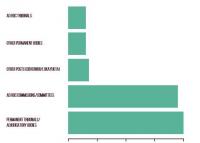 70 out of the 100 Supreme Court judges, who retired as on 12 February 2016, took up post-retirement jobs with various permanent and ad hoc bodies and committees, with the greatest number taking up quasi-judicial posts, according to data collected by the Vidhi Centre for Legal Policy.
70 out of the 100 Supreme Court judges, who retired as on 12 February 2016, took up post-retirement jobs with various permanent and ad hoc bodies and committees, with the greatest number taking up quasi-judicial posts, according to data collected by the Vidhi Centre for Legal Policy.
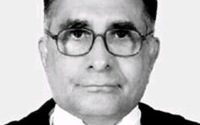 Former Chief Justice if India (CJI) SH Kapadia passed away last night in Mumbai aged 68.
Former Chief Justice if India (CJI) SH Kapadia passed away last night in Mumbai aged 68.
The Supreme Court yesterday recommended that former Chief Justice of India SH Kapadia should mediate in a dispute of the Bombay Parsi Panchayet (BPP) over two priests who were banned for allegedly performing allegedly unsanctioned ceremonies. The ban was quashed by the Bombay high court in 2011, and appealed by the BPP to the Supreme Court, having spent more than Rs 3 crore on litigation expenses.
The BPP chairman Dinshaw Mehta said: "We are bleeding at the moment. In the last two months we have spent over Rs 30 lakh just to get dates for the next hearing." He added that Kapadia would be a good candidate because he was a Parsi, who'd be more easily accepted as a mediator by the community. [Mumbai Mirror]
"After two wasted years, Sathasivam realizes that Kapadia was, after all, right about the Registry," tweeted CourtWitness. Livelaw reported that Chief Justice of India (CJI) Sathasivam said at an AOR-hosted function yesterday that the registry was not listing matters correctly by allowing lawyers to mention matters, following controversy kicked off by senior advocate Dushyant Dave about forum shopping, which the CJI had attributed to a mistake in the registry [@CourtWitness1] [LiveLaw]
Justice Bhabani Prasad Ray was transferred a week ago from the Kerala high court to become judge of the Odisha HC. [Odisha Sun Times]
Ray was reportedly one of 11 high court judges transferred by former SC CJI Kapadia for "public interest" reasons in 2010 (then from Orissa to Karnataka) [Legally India October 2010]
He was first elevated to the Odisha bench on 7 November 2007, having started practising in January 1979.
 At precisely 10.30am on 28 September 2012, a packed courtroom rose in the Supreme Court of India’s Chief Justice’s Court, as chief-justice-designate Altamas Kabir and former chief justice of India (CJI) Sarosh Homi Kapadia – a little behind him - walked in to preside together in this court for the first and the last time.
At precisely 10.30am on 28 September 2012, a packed courtroom rose in the Supreme Court of India’s Chief Justice’s Court, as chief-justice-designate Altamas Kabir and former chief justice of India (CJI) Sarosh Homi Kapadia – a little behind him - walked in to preside together in this court for the first and the last time.
Former chief justice of India (CJI) SH Kapadia was yesterday appointed the Bombay Stock Exchange’s (BSE) public interest director, four months after he retired as the CJI.
The Securities Exchange Board of India (SEBI) nominated him to the post.
Kapadia dealt with matters under the SEBI Act 1992, the Companies Act 1956, the RBI Act, mergers and acquisitions, the Banking Regulation Act, taxation, the Information Technology Act 2000, and validity of the Indian Accounting Standards during his stint as a Supreme Court judge from 2003 onwards. [Business Standard]
According to several authoritative sources, Kapadia is also understood to have taken chambers in the offices of Gagrats in Mumbai; he started his legal career at the firm's precursor, Gagrat & Company.

A lot of the recent frictions between the judiciary and the media are little more than misunderstandings, argues Kian Ganz.
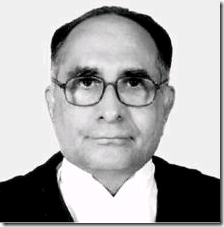 After he retires as Chief Justice of India (CJI) today, Sarosh Homi Kapadia will leave a legacy that will be both defined and shrouded by his circumstances.
After he retires as Chief Justice of India (CJI) today, Sarosh Homi Kapadia will leave a legacy that will be both defined and shrouded by his circumstances.
Today, blogging live from 2pm on the presidential reference about Supreme Court Justice GS Singhvi’s 2 February judgment that cancelled all awarded 2G licences and said that all natural resources should be allocated by the government by auction.
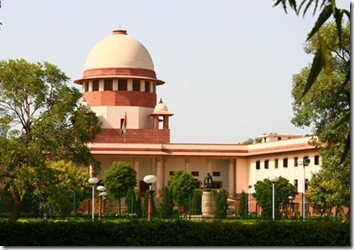 The Supreme Court served the newspapers Indian Express and Daily Pioneer with a suo moto contempt notice for allegedly misreporting court proceedings in stories published in the papers today about sitting Supreme Court judge Swatanter Kumar’s recommended appointment to the National Green Tribunal (NGT).
The Supreme Court served the newspapers Indian Express and Daily Pioneer with a suo moto contempt notice for allegedly misreporting court proceedings in stories published in the papers today about sitting Supreme Court judge Swatanter Kumar’s recommended appointment to the National Green Tribunal (NGT).
After Forbes profiled CJI Kapadia’s career at its dusk, it is now time for The Telegraph to docket India’s future boss Altamas Kabir’s run-up of seven years and 21 days to the helm, and his days before and after.
Sending a husband to jail for taunting his wife on her dark complexion, ruling for power to trans-gender people, giving a landmark judgement bringing female relatives of the husband definitively under the Domestic Violence Act, Kabir fought for the undermined against the might of the state in his time at the Supreme Court.
As the 57-year-old chief justice of Jharkhand high court, where he was transferred to within weeks of being appointed chief at the Calcutta high court, he set up juvenile courts and passed several orders on the welfare of remand-home inmates.
Often the last judge to leave the Supreme Court, Justice Kabir is popular with junior lawyers
Junior lawyers always felt confident arguing their cases in his court as they knew that he would give them a patient hearing
We need people like him who understand what it means to be marginalised, stigmatised and ostracised simply for the fact that we are who we are
No less delighted at Justice Kabir’s elevation are the 43 inmates of Women’s Probation Home in Namkum, Ranchi. They call him and his wife Minna Kabir “Papa” and “Mummy” [Telegraph India]
 By Nikhil Kanekal: It’s going to be an incredibly tough future for the Subroto Roy-owned Sahara Group (also known as Sahara India Parivar) after today’s judgment by the Supreme Court of India. The court asked two group companies to return an unprecedented Rs 24,000 crores ($4.3bn) to their roughly 28 million investors, while setting the company and its directors up for possible criminal prosecution.
By Nikhil Kanekal: It’s going to be an incredibly tough future for the Subroto Roy-owned Sahara Group (also known as Sahara India Parivar) after today’s judgment by the Supreme Court of India. The court asked two group companies to return an unprecedented Rs 24,000 crores ($4.3bn) to their roughly 28 million investors, while setting the company and its directors up for possible criminal prosecution.
The judgment is a stinging indictment of the company’s practices. It is also probably the largest ever transaction ordered by an Indian court to date.
 Forbes does a profile of Chief Justice of India (CJI) SH Kapadia, gathering a remarkable biography from eating Bombay Chana at Flora Fountain as a class IV employee at Bombay HC, to the breeze in BHC’s courtroom number 3 and his hard-working rise to judge, a special court judge, the chief justice of the Uttaranchal HC, a judge of the SC and, finally, CJI.
Forbes does a profile of Chief Justice of India (CJI) SH Kapadia, gathering a remarkable biography from eating Bombay Chana at Flora Fountain as a class IV employee at Bombay HC, to the breeze in BHC’s courtroom number 3 and his hard-working rise to judge, a special court judge, the chief justice of the Uttaranchal HC, a judge of the SC and, finally, CJI.
“A judge, by virtue of his chosen profession, chooses to become an ascetic, distant from the society he lives in, yet immersed in it so deep that he is confronted with the rawness of its existential struggle every day,” says Kapadia, who keeps himself “hermetically sealed” from society “in his pursuit of flawless integrity”, reports Forbes.
Unsurprisingly, the magazine was denied an interview with the judge but retired justice VR Krishna Iyer tells Forbes he’d gathered that Kapadia was too dignified to even meet other judges.
Much before filling the chair of the chief’s court at SC on 12 May 2010, Kapadia had a landmark judgement associated with his name. In 1982, while practicing at the Bombay bar he fought a case leading to settlement of the legal principle that governments cannot invoke summary eviction laws to throw out people when there is a genuine dispute on the title.
Soli Sorabjee says that litigants return satisfied for being “fully and fairly” heard in Kapadia’s court, even if they lose the case. To fully understand an environmental dispute once, Kapadia made arguing counsel Harish Salve turn the courtroom into a classroom for environmental jurisprudence for seven Fridays in a row.
Feathers in his cap include the disposal of 39 matters within his first half-hour as CJI, streamlining the SC registry so that the much abused practice of “bench-hunting” and “out-of-turn-case-mentioning” became obsolete, the stoppage of illegal mining in Bellary district, disqualification of a wrongly appointed central vigilance commissioner, and the Vodafone judgement [Forbes India | Also see Court Witness’ Sarosh ‘Hercules’ Kapadia’s mid-term appraisal from 2011 (TBC…)]
Calcutta HC lawyers file, while SCBA and West Bengal bar association consider filing, a contempt petition in Cal HC against West Bengal CM Mamata Banerjee who said, “Why should many judgements today be delivered for money? Why?” in the West Bengal assembly on Tuesday. SCBA president Pravin Parekh said: “It is a serious allegation against the entire judiciary, which is very irresponsible, especially for a chief minister.” [Daily Bhaskar]
The UK’s so-called magic circle of top four law firms is not so exclusive anymore: mergers and Swiss Verein alliances have rocketed revenues at CMS Cameron McKenna (combined turnover of £692m – Rs 6,000 crore), Hogan Lovells (more than £1bn), Herbert Smith (£861m) Ashurst (around £590m) and others into some of the UK’s and the world’s largest firms by turnover. [The Lawyer]
Nashik Central Jail inmate grows up to be Bombay HC lawyer, handling civil and criminal cases, after serving his term under conviction for murder. Hitesh Shah who “unintentionally” murdered a relative in a loan scuffle in 1989 and was convicted in 1992, went on to graduate from Narjeevan Law College after his release. “I met lot of good people even in jail. I began getting their cases while I was in jail, even before I enrolled as a lawyer. I did not feel the need to work under a senior lawyer. When in prison, I met a senior advocate from Bombay high court, S G Kudle, who was serving a three-month sentence for contempt of court, and whenever I need guidance, I seek it from him," says Shah [TOI]
Bom HC rules that for public servants to be convicted under POCA, “there first has to be a demand made by the accused, coupled with a voluntary payment of bribe by the complainant”. Just an “offer" of money “without demand” will entitle the accused to benefit of doubt. The Nagpur bench of Bombay HC acquitted a senior clerk in a first class judicial magistrate’s court, more than seven years after his arrest for allegedly accepting Rs 300 for producing case papers in court [DNA India]
Pointing to his own example, CJI Kapadia says that India is the only country where minority community members can aspire to become judicial heads, “because of the full play given to constitutional value and ideals”. Attorney General Vahanvati, also a member of a minority community, seconded his sentiment [TOI]
On 150th anniversary Bombay HC exhibits Gandhi’s 1923 cancellation from the advocates’ rolls after the freedom fighter was convicted for sedition for his articles written in ‘Young India’. The exhibition also displays the letter enrolling BR Ambedkar and Bombay 1948 chief justice MC Chagla as advocates, the three sedition trials of Tilak, ancient court fee stamps and lease deeds, and a Gujarati summons [Express]
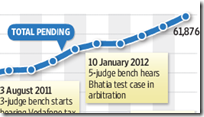 When Chief Justice of India S.H. Kapadia started his term in May 2010 it was widely reported that he didn’t take the traditional May-June court vacation but worked through it, aiming to look at ways of reducing the time it takes to hear cases and making the Supreme Court administration more efficient.
When Chief Justice of India S.H. Kapadia started his term in May 2010 it was widely reported that he didn’t take the traditional May-June court vacation but worked through it, aiming to look at ways of reducing the time it takes to hear cases and making the Supreme Court administration more efficient.
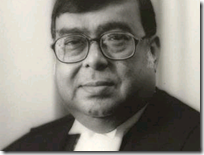 It’s four in the evening and shadows lengthen along the main corridor of the Supreme Court of India. It is Friday, a miscellaneous day, and all courts have completed their work in time to enjoy what passes for a busy lawyer’s weekend - Friday evening.
It’s four in the evening and shadows lengthen along the main corridor of the Supreme Court of India. It is Friday, a miscellaneous day, and all courts have completed their work in time to enjoy what passes for a busy lawyer’s weekend - Friday evening.
All except one court.